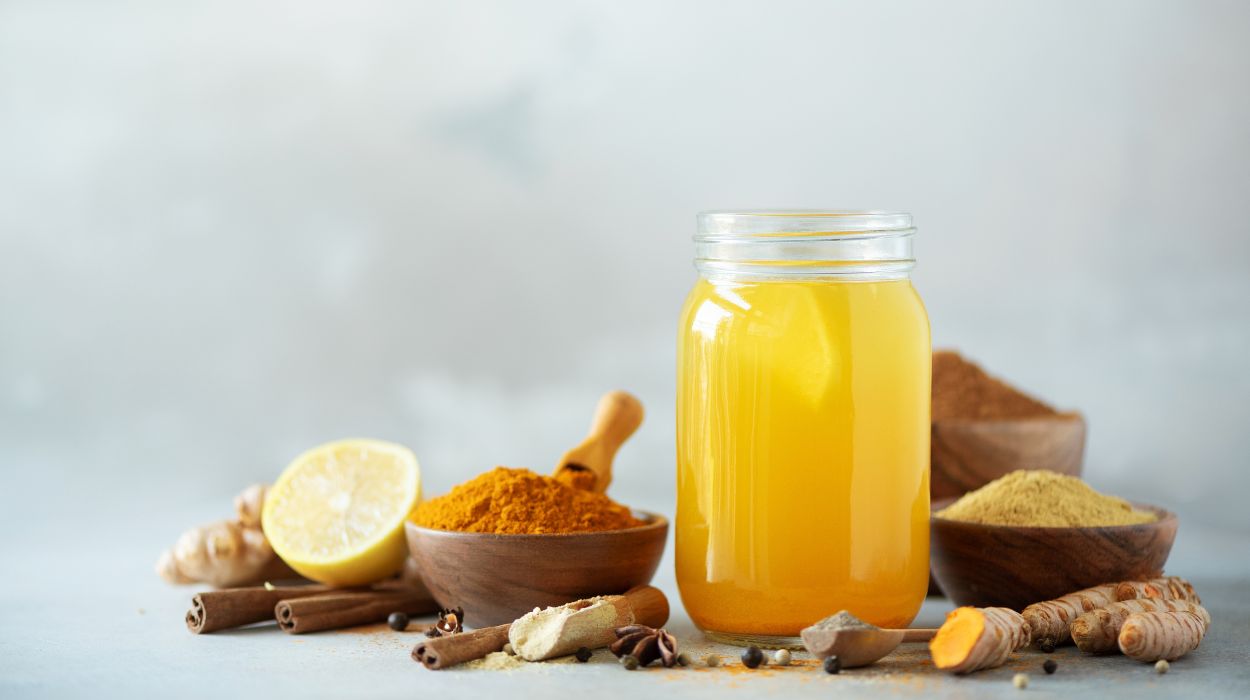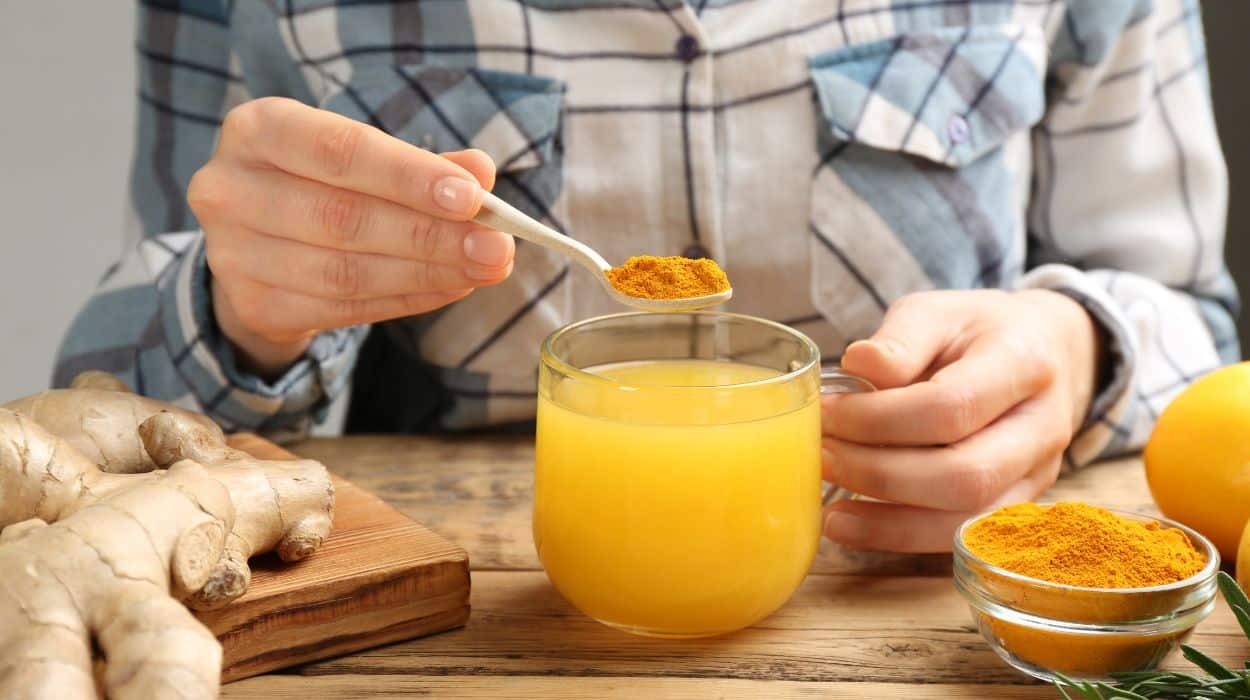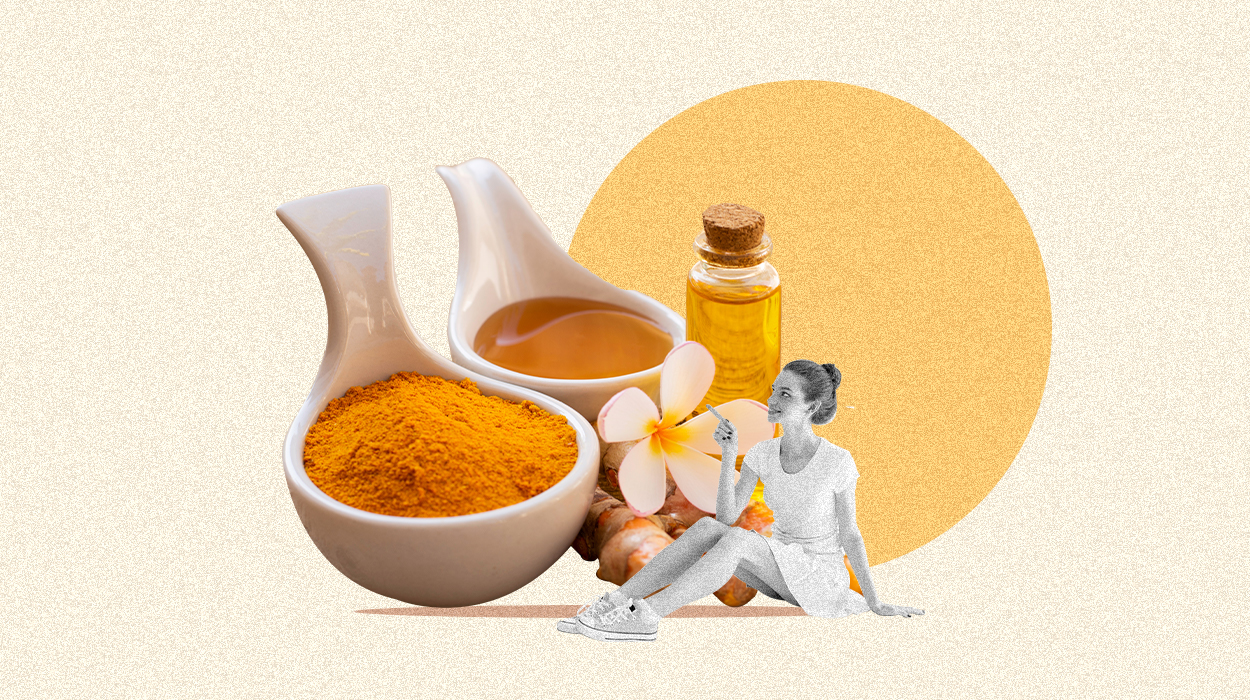Turmeric is an ancient spice that comes from the Curcuma flowering plant which is native to India and Southeast Asia. It is closely related and visually similar to ginger. Turmeric has an earthy, pungent taste and is used in many cooked dishes, especially curries, widely recognizable by its dark yellow/orange color. In addition to its culinary properties, turmeric has been used medicinally for thousands of years to treat skin, respiratory, and joint issues. In more recent times, it has been used in turmeric supplements to treat ailments ranging from liver disease to gastrointestinal disorders, depression, and allergies. Read more about turmeric benefits here.
Top 8 Health Benefits Of Turmeric 2024
- Improves liver function.
- Improves skin health.
- Improves digestion.
- Neutralizes free radicals.
- Can boost BDNF (Brain-Derived Neurotrophic Factor).
- Can prevent heart disease.
- Can treat Alzheimer’s.
- Can balance blood sugar.
Science-Backed Health Benefits Of Turmeric

Improves Liver Function
The liver’s job is to filter toxins from the body, aiding in a natural detoxification process, but the liver can easily get overwhelmed when the toxic burden is too high from things like medications, alcohol, air pollution, and chemical products. Turmeric extract helps to protect the liver from these agents and can rid excess cholesterol[1] from the liver, in turn reducing fatty deposits and subsequent inflammation. Some studies also suggest that curcumin, the main compound in turmeric, can play a role in treating non-alcoholic fatty liver disease.[2]
Improves Skin Health
Many skin conditions come down to inflammation and an imbalanced gut microbiome (the gut microbiome influences the skin microbiome). Turmeric not only reduces inflammation, which can then ease symptoms such as eczema, rashes, and acne, but turmeric helps the gut microbiome flourish, which can then have positive effects on the skin’s microbiome. Turmeric has also been shown to help with wound healing by decreasing oxidation and inflammation, and when applied topically, can help the skin to naturally glow. For this reason, turmeric can be added to face scrubs and creams.
Improves Digestion
Turmeric has been prescribed for a variety of GI ailments[3] and conditions including acid reflux, bloating, indigestion, irritable bowel syndrome, inflammatory bowel disease, and even certain GI cancers. The anti-inflammatory agent in turmeric serves as a healing aid in digestion, as many GI disturbances are rooted in inflammation. Additionally, turmeric increases the amount and diversity of beneficial gut bacteria,[4] having positive cascading effects on digestion and overall health. Turmeric is also considered a “bitter” food which helps to stimulate stomach acid production, which then helps to break down food better during the digestive process.
Neutralizes Free Radicals
Free radicals are “highly reactive molecules with unpaired electrons”,[5] and usually react with our DNA as well as other chemicals in the body including fatty acids and proteins. Free radicals left unchecked can cause oxidative stress or damage inside the body, and it’s thought that this process is responsible for many diseases and premature aging. However, antioxidants, such as the ones found in turmeric, help to combat or neutralize free radicals. It’s also been suggested that in addition to combatting free radicals, turmeric may also encourage other antioxidants to join in and fight free radicals.
Can Boost BDNF
BDNF (brain-derived neurotrophic factor) is a protein produced by the central nervous system. BDNF is responsible for the functioning and development of brain neurons and synapses (the spaces between neurons). It is also behind the brain’s ability to be malleable (neuroplasticity) so that we can learn and remember new things and rewire how we think and behave. BDNF is needed for good communication to take place between neurons on an ongoing basis, but it naturally declines as we age, and too much of a decrease can create memory problems and lead to cognitive diseases. However, turmeric contains polyphenols which have been shown to boost[6] BDNF.
Can Prevent Heart Disease
Heart disease does not happen overnight; there are many steps in the process and curcumin, the main compound in turmeric, may help to reverse some of those steps. It does this by enhancing blood vessel functioning (when the vessel linings don’t function correctly, it can easily lead to heart disease). Some studies have suggested that turmeric may be as effective as exercise for the prevention of heart disease, especially for women. The reduction of inflammation and oxidative stress are two more factors turmeric is known for in helping to lower blood pressure and protect the heart.
Can Treat Alzheimer’s Disease
In addition to boosting BDNF, turmeric plays other roles in brain health and cognition. Curcumin extract is able to cross the blood-brain barrier, which makes it highly successful in its healing capabilities, allowing the anti-inflammatory effects to get directly into the brain (chronic inflammation is a leading cause of Alzheimer’s Disease). Another aspect of brain dysfunction, amyloid plaques, which are protein buildups in the brain, are shown to be behind Alzheimer’s; studies have found that those plaques can be cleared by taking or consuming curcumin in therapeutic doses.
Turmeric Extracts Can Balance Blood Sugar
Keeping a steady blood sugar is crucial for overall health, especially for obese patients. Glucose spikes cause inflammation, which leads to disease, premature aging, fatigue, and so on. Overeating refined sugar from sweets (especially without other foods to slow down the sugar) can lead to glucose spikes and high blood sugar. However, scientific evidence suggests that turmeric can bind to sugar, pulling some out of the bloodstream, and helping to keep blood sugar balanced.
How To Use Turmeric?

Turmeric can be eaten in any number of ways but is most often used as a pre-ground spice to season food. It can be sprinkled into any dish to give it an earthy, curry-like flavor, such as meat, fish, potatoes, rice, stews, and soups, or can even be added to smoothies. Turmeric root can also be juiced as part of a vegetable or fruit juice drink.
As a supplement, turmeric usually comes in powder form encapsulated in a pill. Though curcumin supplements are relatively safe to take daily, discussing individual dosing with your doctor is best.
One thing to keep in mind is that turmeric is not very bioavailable. This means your body isn’t able to absorb a lot of it, so taking more won’t necessarily help. The way to absorb more is to pair it with black pepper – this helps to increase the bioavailability by as much as 2,000%. Also, pair it with a source of dietary fat, as fat increases the absorption of most spices. These tricks will help the curcumin in the turmeric to pass into the bloodstream.
The ratio of turmeric to black pepper when cooking is about ¼ teaspoon of pepper to 1 teaspoon of turmeric. When looking for a turmeric supplement, make sure the supplement also has black pepper in it, then take the supplement with a meal that contains fat.
How To Get Turmeric/Curcumin Supplementation?
Turmeric is sold whole in many stores, especially healthy food stores. However, turmeric is easy to buy online, as well. Turmeric can be bought whole as a root, which would need to be peeled before eaten or juiced (similar to ginger), or as a powder in the spice aisle.
Conclusion
Turmeric is an ancient Indian spice that looks similar to ginger but more orange than yellow and has been used for centuries for its many medicinal properties in addition to its culinary offerings. It adds an earthy and savory flavor to all types of foods while providing anti-inflammatory benefits that have positive effects on digestion, skin health, brain function, heart health, and immunity. Turmeric is sold in grocery stores as a root spice, but may also be purchased in supplement form and taken orally for a variety of ailments.
Frequently Asked Questions
Studies indicate that doses of between 500-2,000 milligrams (mg) per day can help to reduce inflammation, although your unique reason for taking it may alter the amount and frequency at which you take it.
One of the hallmarks of turmeric is that the deep yellow/orange color can stain anything it comes into contact with – dishes, clothes, etc. To reduce staining dishes, store any foods that contain turmeric in stainless steel containers. For anything already stained, try soaking it in hot water and vinegar (twice as much water as vinegar) with a few drops of dish soap and let it soak overnight.
NSAIDs (non-steroidal anti-inflammatory drugs) such as Ibuprofen or Advil can do damage to the GI tract if used regularly, whereas turmeric has anti-inflammatory properties that have been shown in studies to be just as effective as NSAIDs and without health risks. That being said, your unique need to reduce inflammation and treatment protocol should be discussed with your doctor.
 Expert's opinion
Expert's opinion
